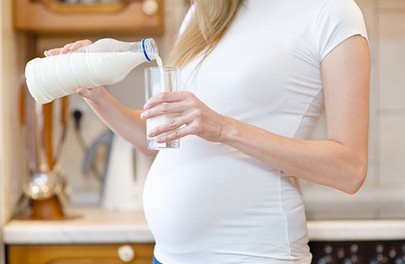Drinking Milk During Pregnancy

Contents:
- Drinking Milk and Pregnancy
- Why it’s Useful to Drink Milk During Pregnancy
- Milk in Pregnancy: Possible Contraindications
- What Kind of Milk to Choose?
- How to Drink Milk During Pregnancy: Basic Rules
Drinking Milk and Pregnancy
Many expecting women wonder whether they can drink milk during pregnancy and in what quantities in order not to harm the baby. Their preoccupation is quite normal – during this important period any product consumed by a mom-to-be in one way or another affect the intrauterine fetal development.
Why it’s Useful to Drink Milk During Pregnancy
To make it clear right away: you do can drink milk during pregnancy if there’s no contradictions and if you stick to simple rules. Milk is a product that can be beneficial for both the mother and the baby.
Milk contains many nutrients actively involved in the formation of the fetus and maintaining the overall health status of a pregnant woman:
- proteins-building muscle tissue;
- amino acids;
- fatty acids involved in the formation of the baby’s nervous system;
- cholesterol helps to synthesize sexual hormones;
- calcium builds bone tissue and the skeleton, and iron helps the body to fully absorb it;
- iron also provides the sufficient amount of oxygen necessary for the child to breathe;
- other microelements (magnesium, sodium, potassium) normalizе metabolic processes;
- vitamins (A, D, B) involved in the intrauterine fetal development;
- lactose (milk sugar) promoting good microflora in the gut, preventing the appearance of disease-causing microbes.
Given these beneficial properties of milk, you absolutely should include this product in your daily diet. Idiosyncrasy is the only stop signal for that.
Milk in Pregnancy, Possible Contraindications
Contraindication against milk intake during pregnancy are not so numerous, but still, you should know them in order to be on the safe side.
Milk may be not only useless, but harmful in the following cases:
- cows milk protein allergy (this allergy usually manifests from the birth);
- enteritis;
- ulcerative colitis;
- lactase deficiency.
If you detect all these contradictions in a timely manner and replace milk with vitamins rich in calcium, nothing will disturb the course of your pregnancy. In order to get the maximum use of this magical product you should learn how to consume it properly.
What Kind of Milk to Choose?

Dietitians all over the world recommend adults to limit amount of consumed milk and replace it with sour milk products. But it is a matter of habit and individual tolerance. If the expectant mother gets pleasure from drinking milk, she should not abandon it. Otherwise, sour milk is a good alternative to whole milk.
Sour milk promotes digestion, prevents constipation, removes toxins from the intestines, and, most importantly, is absorbed at 90%. Milk can be fermented both naturally and with the use of lacto – or bifidobacteria. Bacteria contribute to the protein breakdown in the intestines, which makes this product safe for people with milk protein intolerance.
Pasteurized milk. For obvious reasons fresh milk is unavailable for city dwellers. They have no choice but to drink pasteurized milk, but don’t mix it up with ultra-pasteurized or sterilized milk, shelf life of which can reach up to six months. Such results are achieved by heating milk to 150° C. As a result, nearly all the vitamins are killed. Some unscrupulous manufacturers can even sell powdered product. Pasteurized milk is stored several days. It is heated to 70° c, which kills harmful bacteria, without affecting vitamins and minerals. Thus, drinking this kind of milk is really beneficial.
Fresh milk. Untreated homemade milk is tasty and healthy, but you can drink it only if you’re used to drinking it since you were a child and only if it’s your cow. Milk sold at stores is less fatty than homemade milk. Thus, if you have never tried fresh milk before, you’d better not to do it now. It can cause diarrhea, as well as put burden on pancreas, liver, and kidneys. In no case drink untreated milk bought at the market.
Fresh milk is considered the most useful. In the first two hours it features bactericidal activity, i.e. the ability to kill harmful microbes. However, you can consume it only if you are sure in the product’s quality.
Condensed milk. Unfortunately you can’t find this product on shelves in the natural form. Most manufacturers sell very sweet liquid and call it "condensed milk" . However, if the mom-to-be is craving for condensed milk, there’s a way out. She can purchase fresh milk and make condensed milk on her own. It will be delicious and safe.
Infant formula contains milk powder. It is produced from natural pasteurized milk. It contains less cholesterol than the whole milk and is rich in vitamins, minerals and proteins. Pregnant women can consume it, but beware of imitations.
How to Drink Milk During Pregnancy: Basic Rules
Even such a useful product as milk, can cause troubles if it consumed in the wrong way. Remember that you have no right to risk your well-being, nor the health of your baby, so stick to the recommendations of specialists.
- Milk is better absorbed if thinned with tea, juice or just water in a ratio of 2 to 1.
- Don’t drink milk after the meal.
- Drink milk slowly making small sips.
- Do not drink cold milk: it must be either warm or of room temperature.
- Avoid buying milk at shops. Pregnant women should drink natural, homemade milk, but it is better to boil it before drinking.
- Drink milk with honey before going to sleep.
Now you know how to drink milk during pregnancy, when it’s useful and when it’s contradicted. Be sure to include fresh, natural milk in your diet — and your baby will get everything necessary for its normal formation and further development.
Video: Drinking Milk During Pregnancy